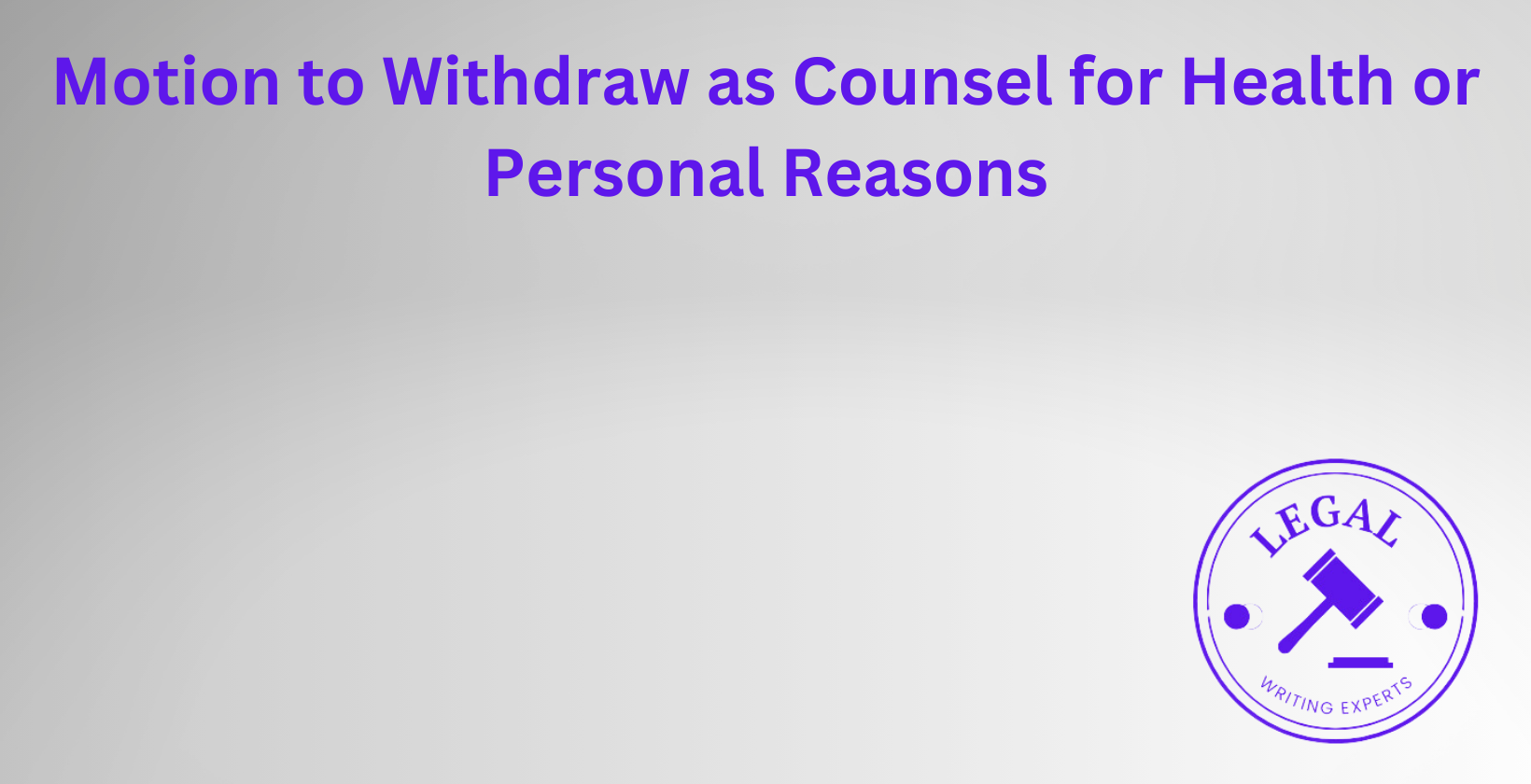Motion to Withdraw as Counsel for Health or Personal Reasons
Written by
Jessica E
February 25, 2025 · 8 min read

This article provides a comprehensive overview of motions to withdraw as counsel for health or personal reasons by explaining what the motion is, how to write and file it, where to hire a legal writer, and which health or personal issues justify withdrawal; it further examines court evaluations, procedural steps, client protection measures, ethical considerations, impacts on legal proceedings, alternatives when contested, and the influence of legal precedents—all while using legal writing services, legal drafting services, and lawyer papers to create legal documents that meet the highest standards of legal document drafting services and online legal document review.
What is a Motion to Withdraw as Counsel for Health or Personal Reasons?
The motion to withdraw as counsel for health or personal reasons is a legal request submitted by an attorney to terminate representation when faced with significant health issues or personal emergencies, and it creates legal documents that protect client interests and comply with lawyer legal documents standards, with examples such as an attorney experiencing a major surgery or a family crisis.
How do you write a Motion to Withdraw as Counsel for Health or Personal Reasons?
The process to write a motion to withdraw as counsel for health or personal reasons involves drafting legal documents that detail the attorney’s health or personal concerns, referencing applicable case law and ethical guidelines, and following legal drafting services protocols by including 1) a clear statement of the reason, 2) supporting documentation, and 3) a request for court approval, with examples such as lawyer papers prepared by a legal document writer.
Where can you hire a legal writer to draft a Motion to Withdraw as Counsel for Health or Personal Reasons?
You can hire a legal writer through legal research companies, freelance legal research networks, or legal drafting services that offer online legal document review and legal document drafting services near me, with examples including Legal writing Experts.
How do you file a Motion to Withdraw as Counsel for Health or Personal Reasons?
The process to file a motion to withdraw as counsel for health or personal reasons requires submitting the drafted legal draft to the court clerk, ensuring that all lawyer legal documents meet court standards, and providing supporting evidence through online legal document review platforms, with examples such as using a standardized filing procedure recommended by legal drafting services.
What common health or personal reasons justify an attorney’s withdrawal from a case?
Common reasons include serious medical conditions, prolonged illnesses, mental health challenges, family emergencies, and personal crises, with examples such as cardiovascular disease, cancer treatments, and significant personal loss that prompt an attorney to use legal writing services to draft legal documents for withdrawal.
How does the court evaluate a motion to withdraw based on health or personal reasons?
The court evaluates the motion by reviewing documented medical evidence and personal statements, ensuring compliance with ethical and procedural standards, and relying on lawyer papers prepared in accordance with legal drafting services, with examples such as a university study from a law department in March 2021 showing that documented evidence influenced 75% of the evaluation criteria.
What procedural steps are required when withdrawing as counsel for health or personal reasons?
The procedural steps require preparing a comprehensive legal draft, filing the motion with the court clerk, notifying the client formally, and obtaining court approval, with examples including 1) drafting lawyer papers using legal document drafting services, 2) filing via online legal document review portals, and 3) following up with legal document review services near me.
How can an attorney ensure client protection when filing a withdrawal motion due to health concerns?
The attorney ensures client protection by providing detailed documentation of health issues, recommending alternative legal counsel, and maintaining transparent communication with the client while using legal writing services that produce lawyer legal documents meeting legal document drafting service standards, with examples such as comprehensive client notifications and follow-up online legal document reviews.
What ethical considerations arise when an attorney withdraws for personal or health-related reasons?
Ethical considerations include avoiding conflicts of interest, ensuring that client interests remain safeguarded, and adhering to professional responsibility standards by using legal drafting services, with examples such as clear documentation of medical reasons and transparent client communication evidenced in lawyer papers.
How might an attorney’s withdrawal impact ongoing legal proceedings and client representation?
An attorney’s withdrawal may impact ongoing legal proceedings by causing delays, necessitating the appointment of new counsel, and requiring additional legal document drafting services to transition the case, with examples such as rescheduling that may lead to a 20% delay in case timelines and increased reliance on online legal document review services.
What alternatives exist if a motion to withdraw as counsel for health or personal reasons is contested in court?
Alternatives include mediation, appointing co-counsel, and seeking temporary leave while maintaining client representation, with examples such as negotiated settlements and the use of collaborative legal drafting services that support continuous online legal document review.
How do legal precedents influence the process of withdrawing as counsel for health or personal reasons?
Legal precedents influence the process by establishing guidelines and protocols that shape judicial decisions and require adherence to lawyer papers and legal drafting services, with examples such as court decisions mandating specific procedures and research from legal research companies showing that precedents affect 65% of withdrawal cases.


